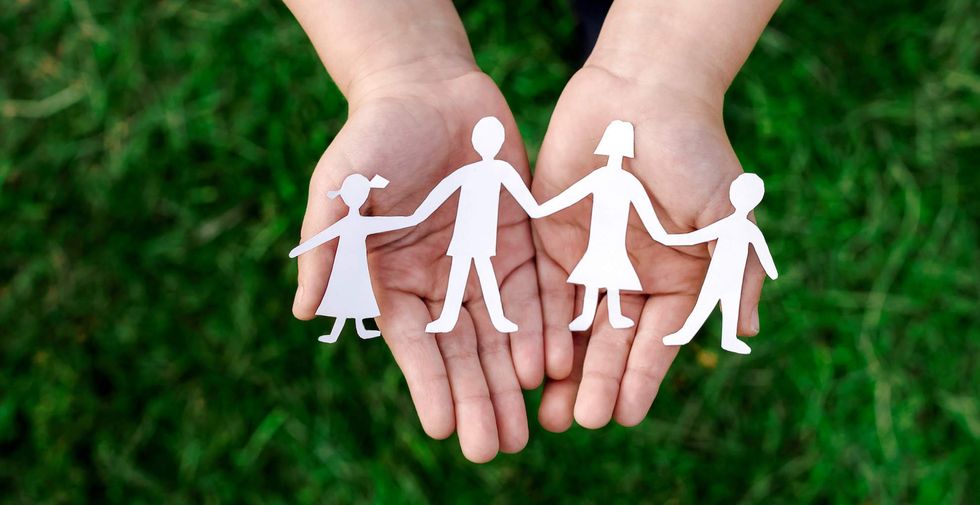
Courts and lawmakers in at least 12 states have decided that children can have more than two parents as part of a growing trend called “tri-parenting.” (Getty Images)

For some families, a measly two parents just don’t cut it.
When she was 16 years old, Madison Bonner-Bianchi and her three parents, whom she calls “mom,” “dad,” and “mama,” crowded into a California courtroom where Victoria Bianchi joined former partner Kimberli Bonner and friend Mark Shumway to become a parent, The Associated Press reported.
In 2000, Bonner, who was in a partnership with Bianchi, gave birth to Madison. At the time, California allowed for only two legal parents. Shumway, a long-time friend of Bonner and the girl’s biological father, knew it was important for Bianchi to be a legal parent, but at the time he “could not do that, sign away the rights to my daughter,” he said.
But now “tri-parenting” is legal in California, and it’s gaining traction in other states, too.
Bonner-Bianchi, who is now 17, said her parents are just like anyone else’s — “I just happen to have three of them.” The one drawback, she admitted, is it sometimes takes some work to get input from three different parents.
“But the big picture is: You just have more people there to support you and be there for you and love you no matter what,” she said. “Honestly, I look up to all of them.”
In fact, Shumway likes how “tri-parenting” has worked out so much, he wants to do it again: This time with his husband and a female friend.
University of Indianapolis Professor Anita Jones Thomas, who heads the American Psychological Association’s child-and-family section, said three-way parenting can be beneficial to a child.
“That extra sense of social support has really been found to be beneficial for children,” she said.
But not everyone has such a positive perspective about the practice.
One University of Virginia sociologist, W. Bradford Wilcox, said children in two-parent households perform better academically and emotionally.
“This is going to be a family form where children are exposed to more complexity and more instability,” he said of “tri-parenting.”
And that has definitely been the case for Kitty Stillufsen, longtime friend Darren Greenblatt, and his now-husband Sam Hunt. None of them foresaw how difficult “tri-parenting” would be when their daughter — who has Stillufsen and Greenblatt’s DNA and Hunt’s last name — was born in 2009.
The three parents had worked out a plan until 2013, when Stillufsen wanted to marry her California-based boyfriend and enroll her daughter in school in the Golden State. Greenblatt and Hunt objected, so they sued for custody.
When a judge ruled that Hunt is a “psychological parent,” Stillufsen’s California plans were dashed. Now all three parents — who share equal custody of the child — live in New Jersey with their young daughter.
Hunt, however, wasn’t declared a legal parent. The judge said lawmakers needed to decide whether or not “tri-parenting” should be permitted because such a practice will have “far-reaching implications” — a reality Stillufsen is now coming to understand.
She now believes “tri-parenting” is “logically dangerous territory” that creates unnecessary turmoil for children.
“We were naive,” Greenblatt said. “Our example should be a cautionary tale. But then again, we have this beautiful, smart, funny, amazing kid.”
Despite the difficulties surrounding the three-parent policy, “tri-parenting” is becoming more commonplace.
In addition to California, where Bonner-Bianchi’s parents invoked a 2013 state law that arose after a lesbian couple’s daughter was placed in foster care when her biological father lost a bid to be declared a third parent as he sought custody, and New Jersey, which blocked Stillufsen’s move over the issue, “tri-parenting” has enjoyed legal successes in 10 other states.
California and Maine are the only states, though, that have passed laws protecting “tri-parenting.” The Golden State legalized the practice in 2013 while lawmakers in the Pine Tree State OK’d three-way parenting in 2015.
The state Supreme Courts in Louisiana and North Dakota have ruled in favor of “tri-parenting.” In the remaining states — Alaska, Delaware, Florida, New York, New Jersey, Oregon, Pennsylvania, and Washington State — only lower courts have addressed the matter.
The next geographical area to contemplate legalizing “tri-parenting,” according to The Associated Press, is the nation’s capital.
Though it doesn’t appear any three-parent situations have been legally recognized in Washington, D.C., some family-law attorneys are pointing to a new law regarding surrogate pregnancies that does not address a particular number of “intended parents” who can have contact with a surrogate.
The law, which does block the surrogate herself from having parental rights, went into effect in April and could offer “a substantial open door” to “tri-parenting,” family-law attorney Christopher Locey said.